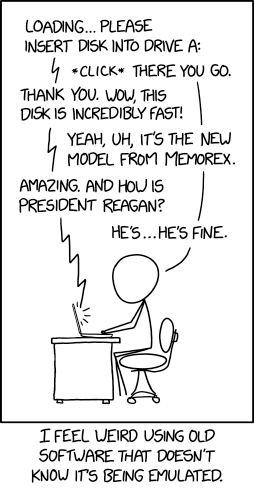Sunday, 15 December 2019 - 2:12pm
This week, I have been mostly reading:
- Emulation — xkcd by Randal Monroe:

- Harvesting the Blood of America’s Poor: The Latest Stage of Capitalism — Alan Macleod in MintPress News:
For much of the world, donating blood is purely an act of solidarity; a civic duty that the healthy perform to aid others in need. The idea of being paid for such an action would be considered bizarre. But in the United States, it is big business. Indeed, in today’s wretched economy, where around 130 million Americans admit an inability to pay for basic needs like food, housing or healthcare, buying and selling blood is of the few booming industries America has left. The number of collection centers in the United States has more than doubled since 2005 and blood now makes up well over 2 percent of total U.S. exports by value. To put that in perspective, Americans’ blood is now worth more than all exported corn or soy products that cover vast areas of the country’s heartland. The U.S. supplies fully 70 percent of the world’s plasma, mainly because most other countries have banned the practice on ethical and medical grounds. Exports increased by over 13 percent, to $28.6 billion, between 2016 and 2017, and the plasma market is projected to “grow radiantly,” according to one industry report. The majority goes to wealthy European countries; Germany, for example, buys 15 percent of all U.S. blood exports. China and Japan are also key customers.
- Placing and Spacing the Dead in Colonial Accra — Sarah Balakrishnan in the Metropole:
Cemeteries were undoubtedly a part of British colonists’ bid to reorganize African societies according to Christian schematics of “civilization”—what has been called the “civilizing mission.” But they also had another, more insidious, ambition. Creating private property in Accra required cemeteries. Graveyards relocated ancestors to the public domain, making it possible for Gold Coasters to sell their property to interested buyers. British colonists had long understood that communities in Accra would never sell their land if it contained the remains of their elders. Public cemeteries thus transferred rituals of social reproduction—celebrating, mourning, and remembering the dead—into the domain of the state, so that private houses could be made fungible and sellable. Like elsewhere in the world, commemorations of death shaped the devolution of property. In colonial Accra, British colonists used cemeteries to enforce private property in land.
- Hoax — Saturday Morning Breakfast Cereal by Zach Weinersmith:

- Leopards do not change their spots — Bill Mitchell:
Keating became Treasurer in 1983 and inherited the emerging neoliberalism about deregulation, privatisation and the obsession with the pursuit of fiscal surpluses. He inherited a weak economy but set about pursuing surpluses as soon as he could and by 1987-88 fiscal year recorded the first of three consecutive surpluses – 0.4 per cent of GDP, 1.5 per cent of GDP and again, 1.5 per cent in 1989-90. The data shows that he only recorded three surpluses during his period as Treasurer. Further, his praise for the Costello surpluses (he became Treasurer when the Conservatives took power in 1996) and was only able to achieve those surpluses because the financial market deregulation mania that both Keating and Costello implemented reduced regulations on banks and oversight by the authorities and led to the credit binge that saw the household saving ratio move into negative figures and household debt rise from about 60 per cent of disposable income to 180 odd per cent. Without that unsustainable credit binge, the economy would have tanked under the strain of Costello’s fiscal drag (the surpluses) and he would have been back in deficit quick smart. Just as Keating experienced after his obsessive pursuit of surpluses. In 1990-91, Australia had its worst recession since the 1930s.
- Household Debt: A Tale of Three Countries — Steven Hail for Renegade Inc:
The beneficial role of the deficit, and the irrelevance of its impact on the stock of Japanese government debt, is not generally understood, even in Japan. Debt and deficit in Japan are not a sign of economic failure – they are the hallmark of a largely successful attempt to maintain living standards and close to full employment labour market, in an economy where private saving (and especially corporate saving) has outstripped private investment spending. It is very important to understand this. Many economists, commentators and credit ratings agencies still don’t understand this. They have been vaguely forecasting doom, or at least some kind of financial crisis, for Japan for a couple of decades now. It wasn’t in Japan that the Global Financial Crisis developed. It wasn’t in Japan that the problems of the euro emerged. It isn’t Japan that is faced with dangerous household debt now. These various commentators still don’t understand the fiscal space enjoyed by monetary sovereigns like the Japanese government. They don’t understand the appropriate role for the government’s budget in such countries. They look for crises where none will occur. They miss the financial fragilities which drive those crises that do happen. They are very slow to learn. The only thing to do is to ignore them and their advice.
- Manufacturing Fear and Loathing, Maximizing Corporate Profits! A Review of Matt Taibbi’s Hate Inc.: Why Today’s Media Makes Us Despise One Another — by John Siman in Naked Capitalism:
Because of the tweaking of the Herman/Chomsky propaganda model necessitated by the disappearance of the USSR in 1991 (“The Russians escaped while we weren’t watching them, / As Russians do…,” Jackson Browne presciently prophesied on MTV way back in 1983), one might now want to speak of a Propaganda Model 2.0. For, as Taibbi notes, “…the biggest change to Chomsky’s model is the discovery of a far superior ‘common enemy’ in modern media: each other. So long as we remain a bitterly-divided two-party state, we’ll never want for TV villains”.
- Impeachment Talk — This Modern World by Tom Tomorrow:
